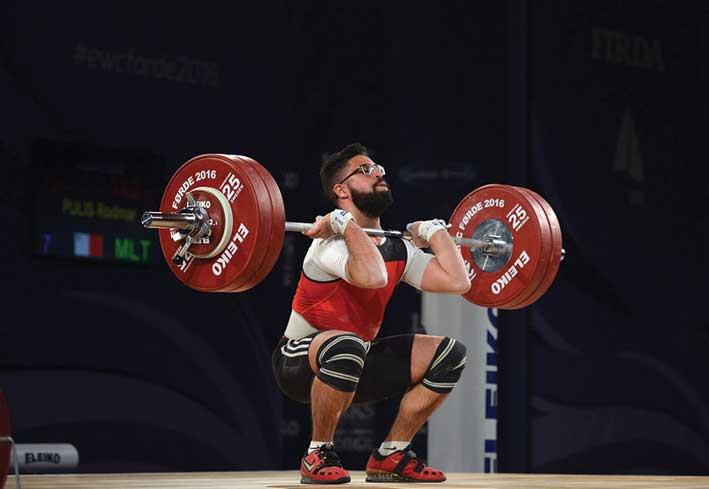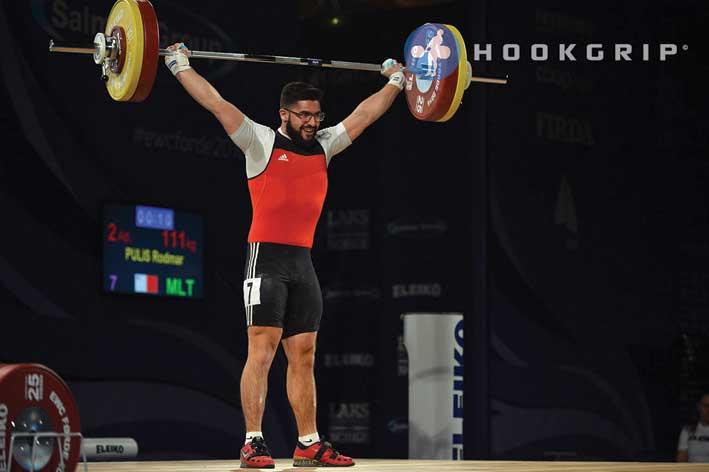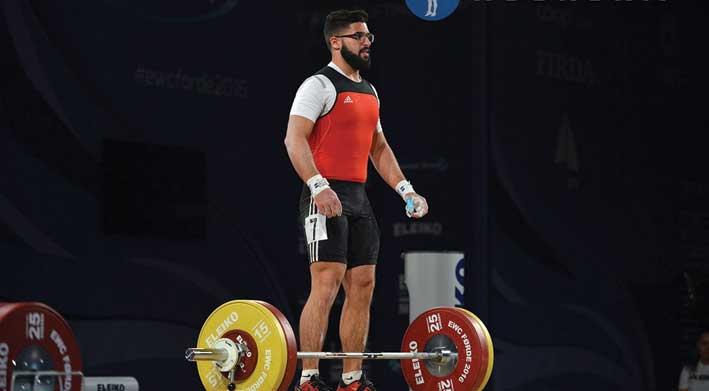Rodmar started weightlifting at the age of 9. "My uncle and aunt introduced me to this sport. They used to train and compete in this discipline themselves. When I started, I didn't take it seriously. I just trained once a week with my aunt. We used to focus mostly on developing my technique and fitness capacities. The training sessions involved a lot of Snatches and Clean & Jerks with a broom stick. Then I stopped when I was 11 and began again training with my present coach when I was 14."
Rodmar admits that initially weightlifting training was tedious. "Most of the time I ended up doing lots of technical movements with just a wooden stick. In this discipline technique can be a huge determinant in an athlete's potential success. However, training became more interesting when we started doing box jumps, sprints and other functional exercises."

Our conversation shifts to when Rodmar took part in his first weightlifting competition, way back when he was 9 years old. "At the time I managed to do around 12kg in Snatch and 17kg in the Clean & Jerk. I remember I was terrified of going on the platform and, at the same time, I was really excited to start lifting. During the competition I had both of my relatives on each side of the platform to help me feel more comfortable and that really motivated me to give my best. On the whole, the competition was a great experience that has contributed towards continuing this sport. The satisfaction I felt after each lift was indescribable."
Rodmar is currently a top name in Malta's weightlifting scene. He takes part in all top level competitions and his training is planned accordingly. "When I'm preparing for major competitions I train nine times a week with double sessions on Mondays, Wednesdays and Fridays. Thursdays are usually dedicated to some accessory exercises, stretching and active rest. Sundays are the only 'off' days when we get the time to prepare ourselves physically and mentally for the next week.
"The intensity and volume of training during the week varies as well. Sometimes we begin with high intensities at the start of the week, drop a little at the middle and end up again with high intensity. It all depends on the time of the year. I can say that our national coach Jesmond Caruana has turned periodisation into an art."
Training for nine sessions a week is a huge commitment, especially keeping in mind that Rodmar is a newly qualified Physical Education teacher who has just finished his University year. His ability is summed up in two words: time management. His toughest period was when he got injured while preparing for the Rio 2016 Olympic Games.

"Before I got injured, when I was preparing for the Olympic Games, training for such long hours and keeping up with my studies was a little bit challenging. However, I had a lot of support from my lecturers at the Institute of PE and Sport at the University of Malta. In fact, during my last year I was part of a pilot project for student-athletes where I was assigned two tutors who supported me in everything I needed. I must say that juggling training, exams and my dissertation wasn't easy but with the support I received I managed to extend my studies by one year so that I could do well in both. I really do hope that this idea of student-athletes catches on in our post-secondary educational institutions as it can really help us athletes to excel in both sport and academic work."
Training is what makes an athlete improve but it is during competitions that all the hard work can be fulfilled and appreciated. Rodmar describes his emotions when he is ready to go up the platform and compete. "Once, my coach told me that excitement is like water flavouring. If you put in too much you'll ruin the water. If you put in too little,e the water will taste bad just the same. One has to learn to put in the right amount of flavouring to make the water taste great. I live by this lesson in every competition in which I participate.
"Before each competition I always create a playlist with music that can hype me up and help me concentrate. I prepare all the things I need for the competition and get a good night's sleep. On competition day I put on my lucky briefs, sit down and start talking to myself and start imagining the lifts. Then, when it's my time to shine I turn that excitement, training and hard work into energy to be successful."
The relationship which develops between coaches and athletes is deep and based on mutual trust. Rodmar describes his coach as his second father, his mentor and his life trainer. "I've trained with him for these past 7 years. Together, we've been through thick and thin. He was the one who always pushed me beyond my limits and helped me realise that I had what it takes to be successful. We had our fights and arguments, yes, because we're both a little stubborn. But he was an influential figure in my life and has greatly contributed towards the man I have become today."
Apart from the coach, other athletes also are an important and integral part of the individual athlete's life. "When I injured my shoulder and couldn't train I still felt the urge to go to the gym just to see the other athletes. I can say that they are my second family as we practically live together as we're at the gym most of the time. Luckily I think that we have a great bond. During training and competitions we always support each other, even when we're rivals in the same competition."
But what is so special about weightlifting? "Weightlifting is an allegory of life. Just as in real life, in weightlifting we're constantly trying to overcome harder challenges and set the bar higher and higher. We're always trying to become the best we can be by breaking through the limits. However, just as in real life we need to put work into our goal.
"At times we do not succeed immediately and fail or, even worse, we injure ourselves in the process. These are the times where we need to get back up and try again until we succeed. Finally, the feeling I personally get when I have successfully completed a lift on the competition platform cannot be compared to any other feeling in life. For those few seconds I feel that I'm invincible."

Rodmar's success is also thanks to his family who have supported him constantly. "My family has been with me throughout my whole career and has supported me in every way they can, from preparing my daily meals to offering me moral and psychological support during the hard times, especially after the injury I experienced during the past year when I had torn my shoulder and needed surgery. These are the people who made me feel valued and appreciated even when I felt unworthy of anything."
Maltese weightlifting is on the right track but more still needs to be done. "If we want to be competitive, we need a lot more. We need funds invested in the education of our coaches and in help for athletes to compete more often in international competitions. Having sponsors who could supply us with our daily needs would be of great benefit as well. Finally, I believe that if we're pushing our athletes towards the international limelight, we need to provide them with better financial and psychological support."
Apart from weightlifting, Rodmar has clear plans for the coming months. "My main goals for this year are to successfully complete my dissertation so that I can graduate and I want to recover completely from my shoulder injury so that I can return to the sport as soon as possible." We at A&H wish Rodmar the very best and will be following his career towards his greatest ambition: participating in the 2020 Tokyo Olympic Games. We are sure that the huge impact his sport has had on him so far will be reflected in his coming performances and successes.